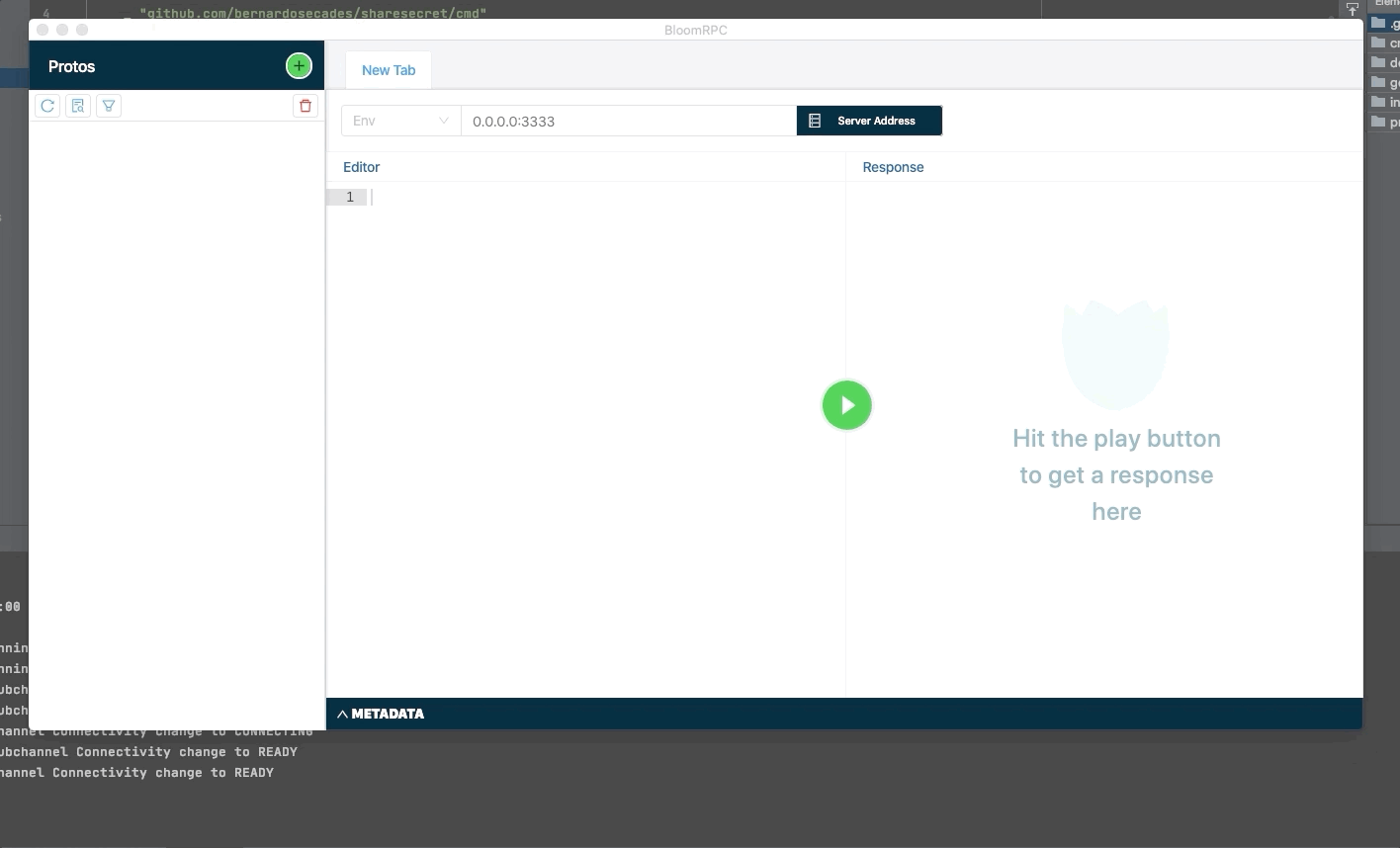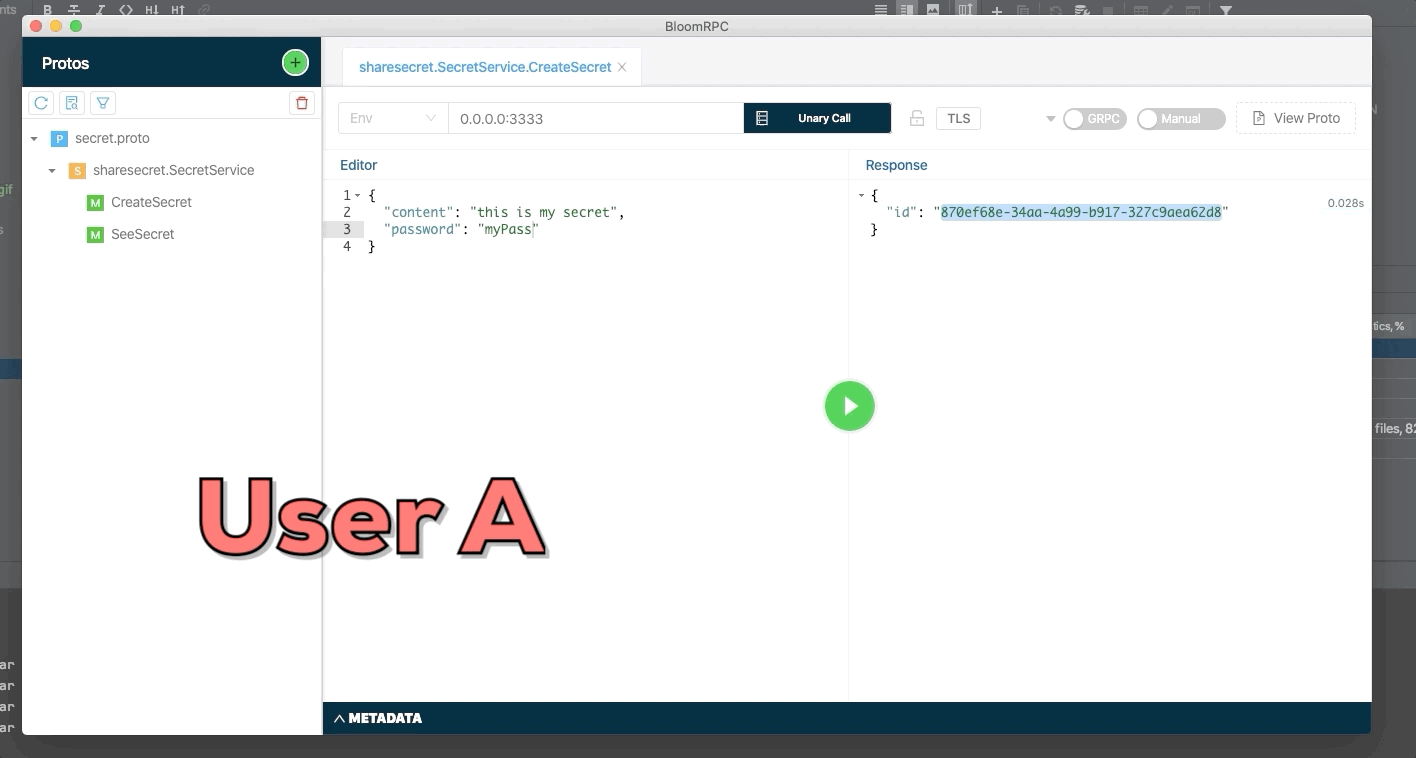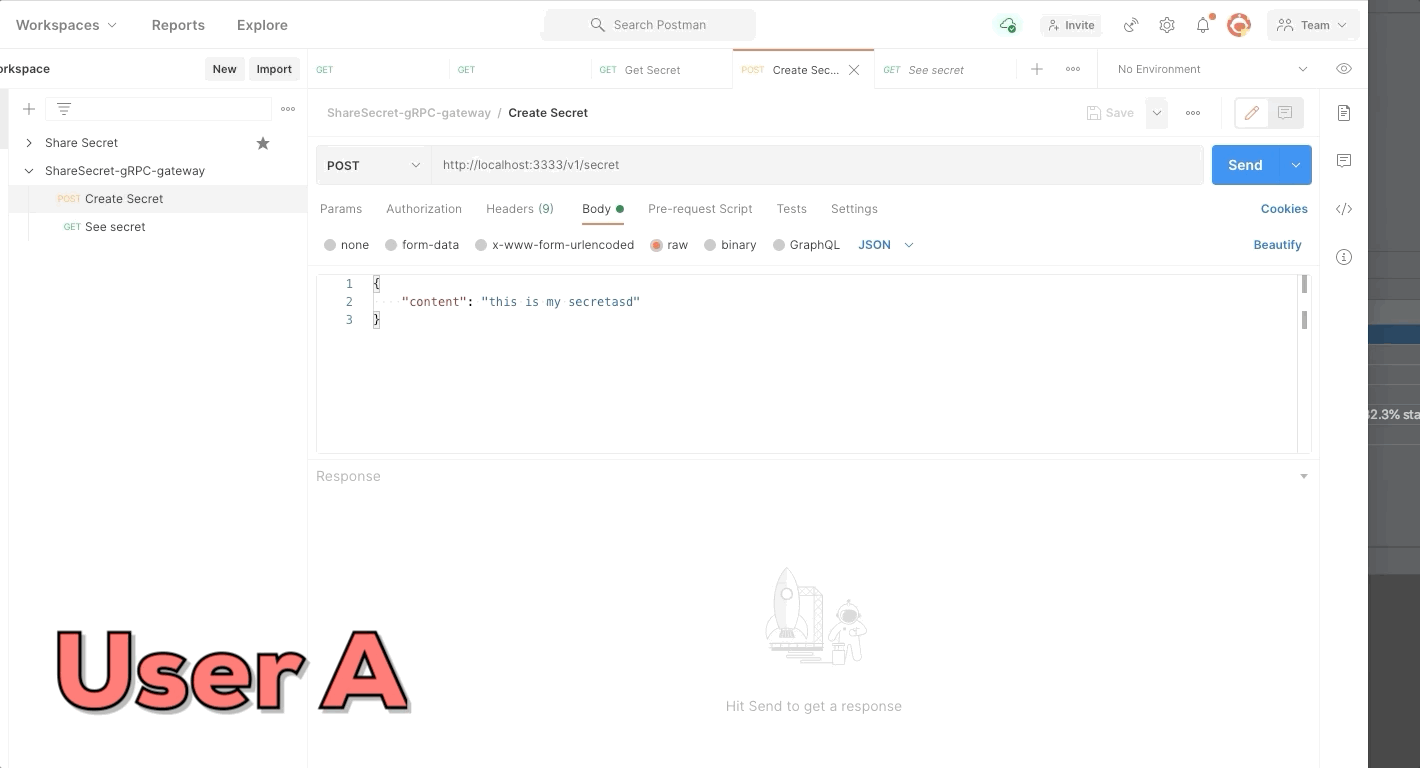ShareSecret is a service to share sensitive information that's both simple and secure.
If you share some text will be display it once and then delete it. After that it's gone forever.
We keep secrets for up to 5 days.
Note: project based on https://onetimesecret.com to learn go, grpc and grpc gateway.
My first version was https://github.com/bernardosecades/sharesecret (I improve transport layer, tests, logic encapsulation, structure folder, makefile, ...)
General we can't do anything with your information even if we wanted to (which we don't). If it's a password for example, we don't know the username or even the application that the credentials are for.
If you include a password, we use it to encrypt the secret. We don't store the password (only a crypted hash) so we can never know what the secret is because we can't decrypt it.
User A create a new secret and send identifier of secret to user B. The secret only can be seen one time, use try to see a second time but the secret was deleted.
User A create a new secret with password and send identifier of secret to user B. The secret only can be seen one time and User B need to know the password to see the secret.
We have the same funcionality with API REST using grpc-gateway
The gRPC-Gateway is a plugin of the Google protocol buffers compiler protoc. It reads protobuf service definitions and generates a reverse-proxy server which translates a RESTful HTTP API into gRPC. This server is generated according to the google.api.http annotations in your service definition
This helps you provide your APIs in both gRPC and RESTful style at the same time.
File proto for this project:
syntax = "proto3";
package sharesecret;
import "google/api/annotations.proto";
option go_package = "genproto;proto";
service SecretService {
rpc CreateSecret (CreateSecretRequest) returns (CreateSecretResponse) {
option (google.api.http) = {
post: "/v1/secret"
body: "*"
};
}
rpc SeeSecret (SeeSecretRequest) returns (SeeSecretResponse) {
option (google.api.http) = {
get: "/v1/secret/{id}"
// Note: if secret require password to see the content client will send "grpc-metadata-password" and we got from context "password"
};
}
}
message CreateSecretRequest {
string content = 1;
string password = 2; // Optional
}
message CreateSecretResponse {
string id = 1;
}
message SeeSecretRequest {
string id = 1;
string password = 2;
}
message SeeSecretResponse {
string content = 1;
}
Without gateway (only gRPC), Generate secret.pb.go and secret_grpc.pb.go:
protoc -I=proto --go_out=. --go-grpc_opt=require_unimplemented_servers=false --go-grpc_out=. proto/secret.proto With gateway (API REST), Generate secret.pb.go, secret_grpc.pb.go and secret.pb.gw.go:
protoc -I=proto -I /Users/admin/go/src/github.com/grpc-ecosystem/grpc-gateway/third_party/googleapis --go_out=. --go-grpc_opt=require_unimplemented_servers=false --go-grpc_out=. proto/secret.proto --grpc-gateway_out=logtostderr=true:./genproto Only you will need execute:
make upOpen BloomRPC (install https://github.com/uw-labs/bloomrpc), import file ./proto/secret.proto and use 0.0.0.0:3333
Example parameters to create a secret without password:
{
"content": "this is my secret"
}Example parameters to create a secret with password:
{
"content": "this is my secret",
"password": "myPass"
}To read a secret without password:
{
"id": "<ID response create secret>"
}To read a secret with password:
{
"id": "<ID response create secret>",
"password": "<Password used to encrypt the secret created>"
}You can execute all tests or by type:
make test-all
make test-unit
make test-integration
make test-e2eUp the service:
make upDown the service:
make downSee status containers:
make psExecute client grpc to see an example:
make client-grpc-connection-exampleRemove secrets expired:
make purge-secretsExecute all tests and see coverage:
make test-coverageExecute all tests:
make test-allExecute all unit tests:
make test-unitExecute all integration tests:
make test-integrationExecute all e2e tests:
make test-e2eThe client NewSecretServiceClient (see folder genproto) gRPC was autogenerated by protoc-gen-go from our file ./proto/secret.proto
package main
import (
"context"
"fmt"
"log"
"time"
"os"
sharesecretgrpc "github.com/bernardosecades/sharesecret/genproto"
"google.golang.org/grpc"
)
func main() {
host := os.Getenv("SHARESECRET_SERVER_HOST")
port := os.Getenv("SHARESECRET_SERVER_PORT")
conn, err := grpc.Dial(fmt.Sprintf("%s:%s", host, port), grpc.WithInsecure())
if err != nil {
log.Fatalf("fail to dial: %v", err)
}
defer conn.Close()
client := sharesecretgrpc.NewSecretServiceClient(conn)
ctx, cancel := context.WithTimeout(context.Background(), time.Second)
defer cancel()
mySecret := "this is a my secret"
fmt.Println("####### CREATE SECRET #######")
fmt.Println("Call gRPC server to create a new secret -> '" + mySecret + "'")
r1, err1 := client.CreateSecret(ctx, &sharesecretgrpc.CreateSecretRequest{Content: mySecret})
if err1 != nil {
log.Fatalf("CreateSecret: %v", err1)
}
fmt.Println("Response from gRPC server:")
fmt.Println(r1.String())
fmt.Println("####### READ SECRET #######")
fmt.Println("Call gRPC server to read the secret with ID -> '" + r1.GetId() + "'")
r2, err2 := client.SeeSecret(ctx, &sharesecretgrpc.SeeSecretRequest{Id: r1.GetId()})
if err2 != nil {
log.Fatalf("SeeSecret: %v", err2)
}
fmt.Println("Response from gRPC server:")
fmt.Println(r2.String())
}We have an unique docker file for development and production environments using multi-stage builds:
- Stage
builderwith golang image to can compile and execute tests (docker-compose use this stage). - Stage
productionwith alpine image with binaries generated inbuilderstage.
Note: we are using upx (see https://github.com/upx/upx) in the docker file to compress binary files generated.


